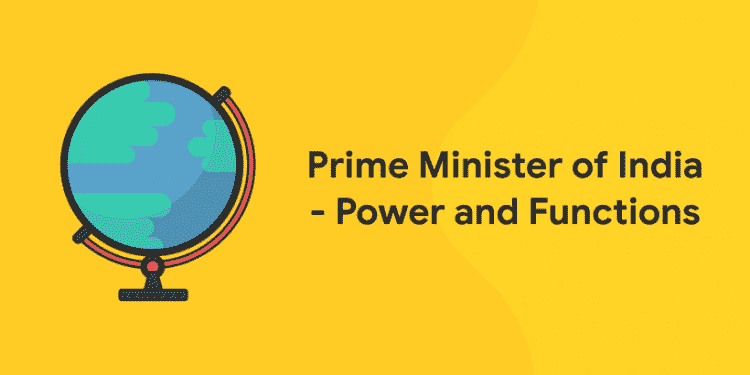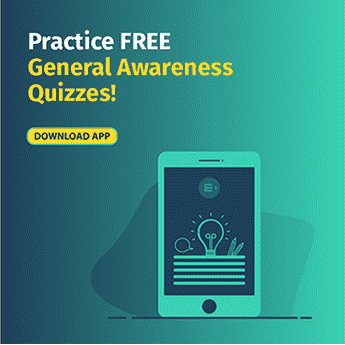As per the Article 75 of the Indian Constitution mentions that a Prime Minister is one who is appointed by the President. Prime Minister is the leader of the Cabinet Ministers or Council of Ministers. The major executive powers of the government are entrusted to the Prime Minister while the President is the nominal head of the State. Thus, we can say that the President is the head of the State whereas the Prime Minister is the head of the Government. Read on the article of Prime Minister of India – Power and Functions, this topic is repeatedly asked in the various UPSC, PSC, and other exams also.
Prime Minister of India – Power and Functions
The Prime Minister is the authority to provide general direction of Government’s activities and ensures coordinated and purposeful work of the Cabinet of Ministers, leads the work of the Cabinet of Ministers and chairs Cabinet sittings and meetings of the Committee of the Cabinet of Ministers.
The Prime Minister has the power to appoint:
- Parliamentary Secretaries of the ministries (according to recommendation by the respective minister)
- Ministers
- Chief of Staff of the Prime Minister’s Office and advisers to the Prime Minister.
The Prime Minister should not be in any post or work in private companies or institutions funded from the state budget or benefiting from the public sector. The Prime Minister is not allowed to win a public procurement contract or gain concessions. To the fulfillment of a specific task in any major section of government the Prime Minister can issue an order to set up temporary consultative councils or working groups (indicating their composition, issues to be considered, activities and responsibilities), which within the scope of their competence present opinion and proposals to the Prime Minister or the Cabinet of Minister. In addition to the direct responsibilities of the Prime Minister, he/she permanently lead the work of one ministry too.
Prime Minister has the right to request resignation of a minister (including Deputy Prime Minister and state ministers). If one or several ministers resign, the Prime Minister himself/herself may temporarily take over their responsibilities or assign them to other ministers. The Prime Minister shall invite other persons to replace the resigned ministers, and inform the Cabinet, the President and Chairperson about the changes. The President is the only nominal ruler while the real executive powers are envisaged in the Prime Minister.
Following points are the main functions of a Prime Minister
- The Prime Minister recommends the names of members of his team to appoint as a Minister. The President can only make those people as ministers whose names are recommended by the Prime Minister.
- The Prime Minister recommends the names of members of his team to appoint a minister. The President can appoint only those persons the ministers who are recommended by the Prime Minister.
- Prime Minister determines that which department will be given to which minister and he can also change the allotted department of any Minister.
- He also presides over the meeting of the Council of Ministers and can change the decisions according to his wishes.
- He can ask any minister to resign or advise the president to dismiss him in case of differences of opinion.
- He also controls and directs the activities of all Ministers.
- He can bring about the collapse of the Council of Ministers by resigning from office.
The Prime Minister has the right to give advice to the President, regarding the appointment of the officers like:
- The Comptroller and Auditor General of India
- Attorney-General of India
- Solicitor General of India
- President of the Union Public Service Commission and its members
- Election Commissioners
- Chairman and Members of the Finance Commission
Start learning with Entri and Get updated
Rights in the context of Parliament
The Prime Minister is the leader of the lower house of Parliament and he has the powers such as:
- He/She advises the President with regard to summoning and proroguing of the sessions of the parliament.
- He/She can recommend the dissolution of the sessions of the Parliament.
- He/She declares government policies on the floor of the house.
- He/She plays an important role in shaping the foreign policy of the nation.
- He/She is the chief spokesman of the Central Government.
- He/She is the leader of the ruling party.
- He/She is ex-officio Chairman of the Planning Commission (now NITI Aayog), National Development Council, National Integration Council, Inter-State Council and National Water Resources Council.
- He/She is the crisis manager-in-chief at the political level during emergencies.
- He/She is the political head of the armies.
Relation to the President
The relationship between the President and the Prime Minister is given in the following two articles of the constitution: Article 74 and Article 75.
- Article 74
There shall be a Council of Ministers to help and advise the President of India. The President shall work as per the instructions given by the Prime Minister but the president has the power to request the council of the minister to reconsider the advice. Although the president is bound to work as per the advice given after the reconsideration.
- Article 75
- The president will appoint the Prime Minister and other ministers shall be appointed by the president on the advice tendered by the Prime Minister.
- The Ministers can remain on his post till the pleasure of the President.
- The Council of Ministers shall be collectively responsible to the Lok Sabha.
Prime Minister’s Duties:
- Submit the report of all the affairs of the Council of Ministers to the President.
- Give full information to the President regarding any emergency situation or any sudden development in the foreign policy.
- Inform the President on all the decisions of the Council of Ministers related to the activities and administration of the Union.
Download Entri app and ace your exam preparation
According to the Dr. Ambedkar, the Prime Minister’s power are “if any functionary under our constitution is to be compared with the USA president, he is the prime minister and not the President of India”. In the Parliamentary system of India, the President is the only nominal Executive Chief and the actual executive powers are contained in the Prime Minister.
Read more articles













